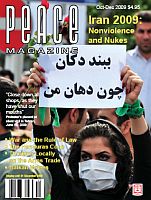
Peace Magazine Oct-Dec 2009, page 15. Some rights reserved.
Search for other articles by Ed Silva here
During the Central American wars of the 1980s, Honduras was the regional safe haven for US backed counterrevolutionaries operating in Nicaragua, El Salvador, and Guatemala. More recently, Honduras may be edging towards its own civil war, one with regional and perhaps hemispheric implications.
On June 28th 2009, the military seized the reformist President Manuel (Mel) Zelaya and sent him into exile. His political crimes were twofold. First, that of responding too fully to the needs of the third poorest population in the hemisphere (after Haiti and Nicaragua). And second, that of rejecting too clearly the "Washington Consensus" on globalization.
Under Zelaya's leadership, and with the energies of grassroots social movements, the minimum wage increased by more than half. State sponsored repression decreased. Sexual diversity was acknowledged. Women's rights were advanced.
These and other reforms elicited opposition from more traditional stakeholders. Landholders objected to land reforms. Catholic and evangelical church officials opposed feminist proposals. The military decried closing down airbases. Financiers bemoaned the refusal to privatize state assets.
And then there was the specter of Hugo Chavez's "socialism" haunting Honduras' traditionalist upper class, fearing that Zelaya's domestic reforms and more independent foreign policy would provoke American anger and punishment, especially since Zelaya had brought Honduras into ALBA: the Bolivarian Alliance for the Peoples of Our America (an agreement that rejects free trade in favor of co-operation, social welfare and sustainability).
In sum, the coup of June 28th was not simply a military seizure of power, but also an expression of traditionalist opposition to the president's domestic reforms and independent foreign policy. The generals acted upon their tacitly shared judgment with other institutional leaders in the Congress, the Supreme Court, the Churches, and parts of the business community as well as neo-conservative elements of the US government.
If the coup expressed the traditionalists' elite judgment against the policies of the elected president, that judgment was not widely shared domestically or internationally. Popular opposition to the coup has been remarkably nonviolent, widespread, and continuous, despite systematic and violent repression.
Perhaps most striking has been the role of women in the resistance to the coup. The president's wife, Xiomara Castro y Zelaya, has led many marches and rallies in the capital city and in the countryside.
Already established feminist connections have become networks of mobilization for meetings and demonstrations. Similar networks emerged for other coup resisters: working people, professionals, peasants, public employees, indigenous and black people, the elderly and students. And from all these emergent networks arose the National Front Against the Coup d'État, co-ordinating a popular and multi-faceted resistance.
The international opposition against the coup has also been widespread. The re-seating of the deposed president has been demanded by the European Union, the United Nations, and the Organization of American States. No nation has formally recognized the coup regime as legitimate, and all but two nations (the USA and Japan) have withdrawn their ambassadors.
Within the hemisphere, the struggle around the coup has intensified. The exiled president journeys from capital to capital rallying support and denouncing the coup. At the same time, international human rights and other NGOs send fact-finding and solidarity missions to Honduras and report the details of the massive nonviolent popular resistance and state repression.
Washington's position is somewhat incoherent. The White House opposes the new regime but refuses to cut off millions in aid to the regime (as "required" in law.) Zelaya visits the US State Department to present his case. The State Department agrees with the OAS opposition to the coup, yet supports a mediation process independent of the OAS. Congressional committees give soap boxes to pro-coup neo-conservative PR flacks, while the American embassy in Honduras urges the popular resistance to reduce its opposition.
Two months after the Honduran coup, its outcome remains in doubt. The intensity of the ongoing struggle between the traditionalist institutional elite coup leaders and the socially mobilized Honduran population, points to the possibilities of profound social transformation.
On the one hand, if the traditionalists' coup succeeds, the clock of social change may be turned back perhaps by decades. On the other hand, if the popular resistance gains power, human rights and aspirations will have a chance to speed up.
Elections scheduled for late November may well provide a rough but visible test of strength between these battling forces, and reveal the net balance for change in Honduras, the region and, perhaps, the hemisphere.
Ed Silva is a retired sociologist in Toronto.

Peace Magazine Oct-Dec 2009, page 15. Some rights reserved.
Search for other articles by Ed Silva here